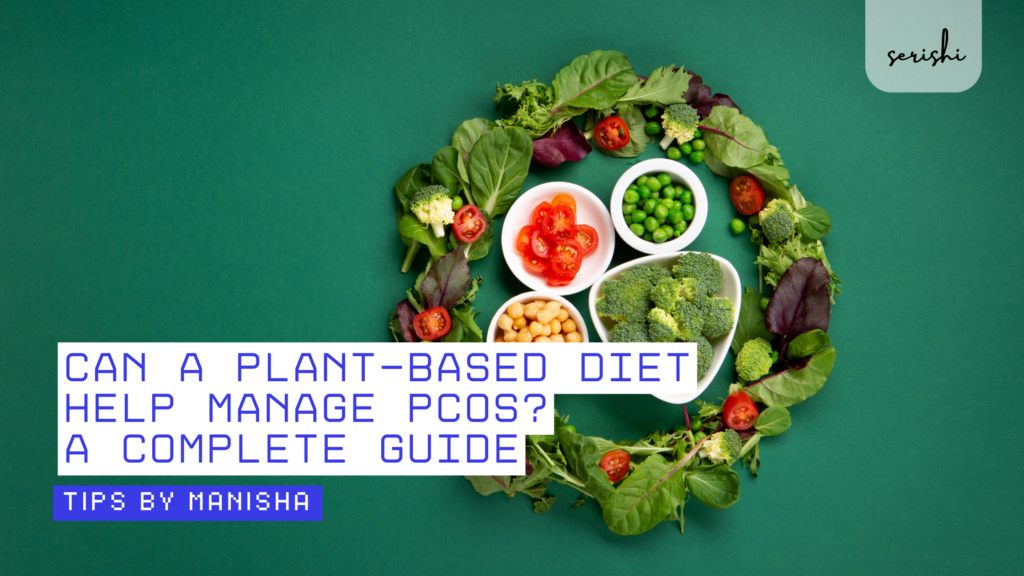Polycystic Ovary Syndrome (PCOS) affects countless women, bringing challenges like hormonal imbalances, insulin resistance, and inflammation. While there’s no cure, diet plays a huge role in managing symptoms—and a plant-based diet for PCOS is gaining attention. Whether you’re fully vegan or just cutting back on animal products, this approach offers a fresh way to feel better. In this complete guide, we’ll explore how a plant-based diet for PCOS works, highlight vegetarian PCOS diet staples, and share tasty ideas to get started. Curious if plants can help? Let’s dig in.
Why PCOS and Plants Go Together
First, let’s unpack why a plant-based diet for PCOS makes sense. PCOS often comes with insulin resistance, where your body struggles to use insulin effectively. As a result, blood sugar spikes, androgens rise, and symptoms like weight gain or irregular periods worsen. Plus, inflammation adds fuel to the fire. So, how do plants help?
A vegetarian PCOS diet is rich in fiber, antioxidants, and healthy fats—nutrients that tackle these issues head-on. For instance, fiber slows sugar absorption, while antioxidants fight inflammation. Moreover, plant-based eating often means fewer processed foods, which can ease PCOS struggles. But does it really work? Let’s look at the benefits.
Benefits of a Plant-Based Diet for PCOS
Now that we’ve laid the groundwork, let’s dive into why a plant-based diet for PCOS is worth considering. Here’s what it brings to the table:
- Improved Insulin Sensitivity: High-fiber plants like lentils stabilize blood sugar, reducing insulin spikes—a key win for PCOS.
- Lower Inflammation: Antioxidant-packed fruits and veggies calm inflammation, easing symptoms like bloating or acne.
- Weight Management: Plant-based meals are filling yet often lower in calories, helping with weight—a common PCOS goal.
- Hormone Support: Healthy fats from nuts and seeds aid hormone production, balancing your system naturally.
Clearly, a plant-based diet for PCOS checks a lot of boxes. However, it’s not just about cutting meat—it’s about choosing the right plants. Let’s explore the best options.
Best Plant Proteins for PCOS
When going plant-based, protein is a big question. Luckily, there are plenty of best plant proteins that fit a vegetarian PCOS diet. Here’s a lineup:
- Lentils: With 9 grams of protein per half-cup, lentils are fiber-rich and blood sugar-friendly.
- Chickpeas: Offering 7 grams per half-cup, they’re versatile—think hummus or roasted snacks.
- Quinoa: A complete protein with 8 grams per cup, quinoa doubles as a carb and protein source.
- Tofu: Packing 10 grams per half-cup, tofu soaks up flavors and supports hormone health with its fats.
- Hemp Seeds: Small but mighty, they deliver 10 grams per 3 tablespoons—perfect for sprinkling.
These best plant proteins keep you full and fueled. For example, toss chickpeas into a salad or blend tofu into a smoothie. Next, let’s see how to build meals around them.
How to Start a Plant-Based Diet for PCOS
Transitioning to a plant-based diet for PCOS doesn’t have to be overwhelming. With a few steps, it’s easy to begin:
- Go Gradual: Start with one plant-based meal a day—swap eggs for a quinoa bowl, for instance.
- Stock Up: Fill your pantry with vegetarian PCOS diet staples like beans, nuts, and whole grains.
- Balance It: Pair best plant proteins with fiber and fats—like lentils with avocado—for steady energy.
- Season Well: Spices like turmeric or cumin add flavor without animal products.
- Track Nutrients: Watch vitamin B12 and iron—consider fortified foods or a supplement if needed.
By easing in, you’ll find a rhythm that works. Plus, brands like Serishi make it simpler with their plant-based protein mixes—great for busy days.
PCOS-Friendly Vegan Meal Ideas
To spark inspiration, here are some PCOS-friendly vegan meals to try:
- Breakfast: Chia pudding with almond milk, hemp seeds, and berries—fiber and protein in every bite.
- Lunch: Quinoa salad with chickpeas, spinach, and a tahini dressing—light yet satisfying.
- Snack: Roasted edamame with a sprinkle of sea salt—crunchy and protein-packed.
- Dinner: Lentil curry with brown rice and steamed kale—warm, hearty, and PCOS-approved.
These PCOS-friendly vegan meals prove plants can be delicious. Plus, they’re flexible—swap veggies or spices to suit your taste.
Why Plants Help PCOS Symptoms
So, what’s the science behind this? A plant-based diet for PCOS leverages fiber to slow digestion, keeping blood sugar steady. Meanwhile, antioxidants from berries or leafy greens fight inflammation, a PCOS driver. Additionally, cutting processed meats and dairy—common in non-plant diets—may lower androgen levels, easing hair growth or acne.
For instance, dairy’s hormones can worsen PCOS, while plants offer a cleaner slate. Consequently, a vegetarian PCOS diet aligns with your body’s needs naturally.
Overcoming Plant-Based Challenges
Of course, switching isn’t always seamless. Some worry about protein or variety. Here’s how to handle it:
- Protein Myths: Combine best plant proteins like beans and rice for all amino acids—no meat required.
- Flavor Fatigue: Experiment with global cuisines—think Indian dal or Mexican black bean bowls.
- Time Crunch: Prep ahead with batches of quinoa or roasted veggies for quick meals.
With a little planning, these hurdles fade, and the benefits shine through.
Quote from Manisha Choudhary:
“Choosing a plant-based diet for PCOS is like planting seeds of hope—nurturing your body with every meal to bloom into a healthier, stronger you.”
About the Author
Manisha Choudhary
Sr. Dietitian cum Nutritionist
Founder, CEO – Serishi
Manisha Choudhary is a seasoned Sr. dietitian and nutritionist passionate about helping individuals achieve healthier lifestyles through balanced nutrition. With over 10 years in the field, Manisha specializes in weight management, chronic disease management, postpartum recovery, and wellness nutrition. Her approach emphasizes sustainable, science-backed diet plans that cater to individual needs without compromising on taste or satisfaction. Manisha is dedicated to empowering her clients with the tools they need to make informed dietary choices, transforming their health and well-being one step at a time.

